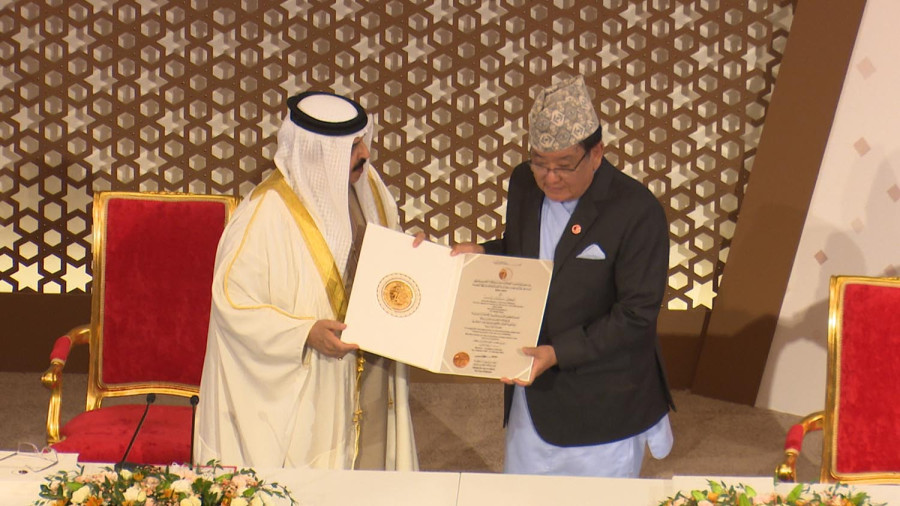Life & Style
A life dedicated to people’s welfare
‘I accept this prestigious award on behalf of millions of patients, their families, my team and the Nepali people.’
Aarati Baral
In a royal ceremony at the ISA Cultural Centre, Manama, Bahrain, on Tuesday, numerous happy and keen eyes were on ophthalmologist Sanduk Ruit, a laureate of the prestigious ISA Award for Service to Humanity. The King of Bahrain, Hamad bin Isa Al Khalifa, handed Dr Ruit $1 million (Rs131 million) during the ceremony.
Dr Ruit was announced a recipient of the fifth edition of the award only a month ago for his immense contribution to humanity through his work on the prevention of blindness. Not only has he reached out to vulnerable and poor communities in Nepal with simple and free procedures as well as low-cost small-incision cataract surgery (a technique to replace cloudy lens inside the eyes with an artificial one) to treat blindness in Nepal, but he has also taken his skills to many other developing countries. So far, he has healed the eye sight of 120,000 individuals.
King Khalifa addressed and welcomed the delegates and journalists from countries including Nepal, Egypt, Syria, Jordan, Lebanon, and Saudi Arabia, among others, at the ceremony. “It is our pleasure to join you at the conclusion of the fifth session of the ISA Award for Service to Humanity,” said the King.
He also congratulated Dr Ruit for his influential works. “On this auspicious occasion, it is a pleasure to congratulate Dr Sanduk Ruit on this well-deserved recognition of his valuable and influential works that have made him the most worthy recipient of this honour,” he said. Shaikh Mohammed bin Mubarak Al Khalifa, chairman of the ISA Award Committee, also lauded Dr Ruit as an example for the world in terms of humanitarianism.
The ISA Award for Service to Humanity organisation was established in 2009 in the name of His Highness the Late Amir of Bahrain, Shaikh Isa bin Salman Al Khalifa. It is granted every two years to either individuals or organisations committed to humanitarian work.
Being shortlisted for one of the most prestigious awards was not easy for Dr Ruit—the process was gruelling. The ISA award jury came to Nepal to study and analyse his works thoroughly. They found him eligible for the award based on honest feedback from patients, the operational status of his methods and their sustainability, knowledge-sharing, and the impact his works have created in the community.
Dr Farhan Nizami, a member of the ISA Award jury committee said that the award ceremony is a moment to celebrate a life so thoroughly dedicated to working for the welfare of people. “Dr Sanduk Ruit has inspired everyone to dedicate their lives to others and take care of them. Moreover, what he has built up has a great influence all over the world. We are also honouring the institutions he is involved in as a whole today. His team has followed in his footsteps of humanitarian service,” said Dr Nizami.
On the eve of the ISA Award for Service to Humanity, the Minister of Information of Bahrain, Ramzan bin Abdullah Al-Nuaimi also highlighted how the kindness of Nepali people as a whole is reflected in Dr Sanduk Ruit’s humanitarian works. “Kindness is embedded in Nepalis, and Ruit has represented them,” he added.
In a speech followed by the award handover function, Dr Ruit said that ISA Award represented the true value of Bahrain and its people. He thanked the Kingdom of Bahrain for being impartial, inclusive, and doing a grass-roots level study to find game-changing humanitarian work. “I accept this prestigious award on behalf of millions of patients, their families, my team and the Nepali people whose goodwill and best wishes I bring to this distinguished gathering,” said Ruit.
Dr Ruit hopes the award will further increase the capacity of the institutions he has been working on, such as Tilganga Institute, Tej Kohli & Ruit Foundation, and the Himalayan Cataract Project, to scale up their work globally. “We have fine-tuned cataract surgery in Nepal and have taken it to other parts of the world. This award will further strengthen our capacity and help us take our skills to more needy people,” he said in a press meeting following the award ceremony.
The journalists present in the press meeting asked Dr Ruit about the challenges he faced while working, the prevalence of cataract surgery in Nepal, the sustainability of the service, and so on. He recalled how, in 1998, when the low-cost intraocular lenses were invented, many multinational corporations opposed them, believing the lenses were too cheap to treat patients. To ensure their quality, Dr Ruit's team over-engineered the lenses. “We were successful in ensuring the lens’ quality. Now I can proudly say that we have distributed 6 million intraocular lenses without a single complaint about them.”
Dr Ruit also revealed his vow to complete at least half a million cataract surgeries in the next five years, especially for those who can’t access and afford the surgery.




 22.69°C Kathmandu
22.69°C Kathmandu










